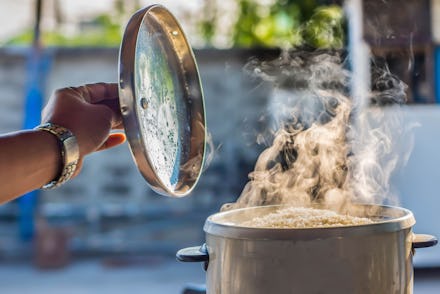Why you should consider packing a rice cooker on your next trip

It's a freezing, blustery evening in Arizona. In the lobby of the Grand Hotel near the Grand Canyon, I notice a family toting in bags of groceries, a gallon of milk, an oversized sack of rice and a rice cooker, and I’m struck by this family’s brilliance. In a National Park, food options usually include granola bars, unappealing cafeteria food or a slightly out-of-the-way McDonald's. Making food in your hotel room can help you eat healthier, save money and customize your meals based on any dietary preferences or restrictions.
It might sound ludicrous to pack a kitchen gadget — especially if you’re getting on a plane — but there’s a growing cohort of health-conscious and money-conscious travelers who view rice cookers, CrockPots and Nutribullets as essential. Even Whole Foods Market founder John Mackey, a millionaire who can afford quality food anywhere anytime, travels with a mini rice cooker to prepare his own hotel breakfasts.
If it’s a major part of your diet, it’s worth its weight
Freelance editor and blogger Sarah Hay is one nomadic kitchen gadget connoisseur. Currently based in Tulum, Mexico, Hay has lived and traveled all over the world, and, for a while she was purchasing rice cookers upon arriving in each of her long-term destinations. Finally, on a trip to San Francisco, she decided to buy a two-serving rice cooker she could use while traveling.
"I don't think this is weird for an Asian person,” Hay said in a Skype interview, noting that she is half Chinese and Filipino and eating rice has always been part of her lifestyle.
Hay packs her rice cooker, which she says weighs “next to nothing,” in her suitcase. And she doesn’t let it minimize her suitcase space — the metal interior protects fragile objects, like her camera or a perfume bottle, which may smash in her luggage.
When traveling or moving to a new city, Hay often stays with friends who don't have rice cookers. “This is just my thing, this is what i like to eat,” she said. “I don't want to make a big fuss. As long as I have electricity, I'm good.”
Once, Hay lugged a juicer she purchased in Los Angeles back to the U.K. Because the expensive juicer didn't have blades, she took it in her carry-on, but she probably won’t travel with it again because it weighed so much. An avid juicer, Hay now brings a lighter juice machine with her. “My body is the car that I live in. I need to fuel it properly,” Hay said.
It can be a massive money-saver
Salt Lake City-based Matthew Massee started traveling with a rice cooker after witnessing his in-laws, who hail from Southern China, use the appliance on a family vacation. They whipped up porridge for breakfast and rice with Cantonese sausage and steamed vegetables.
“They saw how much money we saved by not eating out each meal," Massee said, estimating that traveling with a rice cooker allows him and his wife to spend between $10 to $15 per meal for each day of vacation. Typical meals include rice porridge, hardboiled eggs and a vegetable, tofu or meat-based dish for dinner. For road trips, the couple loads their car with non-perishable ingredients purchased at Massee's local Chinatown, and then they source fresh ingredients from local stores at their vacation destination.
Massee, who likes to travel to national and state parks where the food options can be sparse, has yet to fly with his rice cooker. He estimated his food prep and clean up take about an hour (with assistance from his wife), and they try to repurpose their breakfast leftovers for lunch. All of this happens in a hotel room, and the couple's rice cooker has a top steamer shelf which allows them to cook vegetables or eggs while the cooker prepares the main course below. Leftovers can be stored and reheated in the cooking appliance and one-pot dishes like soup are a cinch to prepare and clean up.
It makes for healthy eating out of town
Culinary instructor and cookbook author JL Fields started traveling with her electric multi-cooker when on a book tour for her cookbook Vegan Pressure Cooking in 2015. This multi-faceted device functioned like a pressure cooker, rice cooker and slow cooker to help prepare a variety of healthy, meat-free meals while she was on the road. By cooking her own meals, she doesn’t have to worry about meat or dairy products (like butter or cheese) sneaking into her restaurant meals.
“I started making quick meals in my hotel room after events and realized this was a great way to travel as a vegan,” Fields said. Spending about $20 at a local grocery store gets her enough fresh food to prepare meals for several days.
For a simple, on-the-road meal, Fields will make a basic mirepoix — that’s diced onion, celery and carrot — with white rice or quinoa. She adds tofu, tempeh or canned beans, all to cook for three to four minutes on low pressure. Stirring in greens like spinach or arugula before she eats helps add another layer of freshness. But if you’re traveling to an incredible food destination like Paris or Rome, you may want to splurge on a few decadent restaurant meals.
If you're visiting a city that isn’t renowned for its restaurants, packing your favorite kitchen appliance may be the key to your tastiest vacation yet.